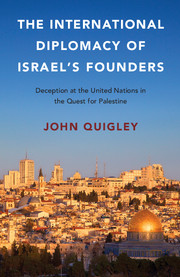 The International Diplomacy of Israel's Founders
The International Diplomacy of Israel's Founders Book contents
- Frontmatter
- Contents
- Preface
- A Note on United Nations Committees
- Abbreviations
- 1 A Public Relations Imperative
- 2 Promises, Promises
- 3 Pranks in Paris and Geneva
- 4 Courting the Commissar
- 5 Saving Europe's Jews – Our Way
- 6 Smoke and Mirrors at the YMCA
- 7 The Ship that Launched a Nation
- 8 Cocktails at the Consulate
- 9 Causing Chaos
- 10 Denying the Undeniable
- 11 A Peace-Loving State?
- 12 Joining the World with Fingers Crossed
- 13 Israel: 1, United Nations: 0
- 14 A Phantom Attack
- 15 Sabras in Sinai: Pardon My French
- 16 Suez Smoke-Screen
- 17 Mr. Nasser, Please Attack
- 18 Abba Eban's Finest Hour
- 19 Old Issues, New Lies
- 20 An Organization Turned Sinister
- 21 Prevarication Pays
- Notes
- Bibliography
- Index
15 - Sabras in Sinai: Pardon My French
Published online by Cambridge University Press: 05 January 2016
- Frontmatter
- Contents
- Preface
- A Note on United Nations Committees
- Abbreviations
- 1 A Public Relations Imperative
- 2 Promises, Promises
- 3 Pranks in Paris and Geneva
- 4 Courting the Commissar
- 5 Saving Europe's Jews – Our Way
- 6 Smoke and Mirrors at the YMCA
- 7 The Ship that Launched a Nation
- 8 Cocktails at the Consulate
- 9 Causing Chaos
- 10 Denying the Undeniable
- 11 A Peace-Loving State?
- 12 Joining the World with Fingers Crossed
- 13 Israel: 1, United Nations: 0
- 14 A Phantom Attack
- 15 Sabras in Sinai: Pardon My French
- 16 Suez Smoke-Screen
- 17 Mr. Nasser, Please Attack
- 18 Abba Eban's Finest Hour
- 19 Old Issues, New Lies
- 20 An Organization Turned Sinister
- 21 Prevarication Pays
- Notes
- Bibliography
- Index
Summary
Cross-line incidents of violence did not diminish in intensity after Qibya. The UN Truce Supervision Organization reported a significant number along the lines with both Egypt and Jordan in the winter months of 1953–54. On March 28, 1954, the IDF again tried to deny a reprisal raid. This incident involved an incursion into the West Bank village of Nahhalin. Houses were attacked, and several village guards were killed. A government spokesperson attributed the raid to civilian Israeli settlers, denying involvement by the Israel Defense Force. The Mixed Armistice Commission investigated and concluded that the raid was carried out by “militarily trained Israelis,” who were firing automatic weapons, detonating explosives, throwing hand grenades and incendiary bombs.” The raid was indeed the work of an IDF force, a unit of 60 paratroopers under the command of Major Ariel Sharon. The government was caught again lying. The very public exposure of its false denial in the Qibya raid had not deterred it from trying again.
THE EGYPTIANS ATTACKED FIRST
A different defense was claimed for a raid on February 28, 1955 into the Gaza Strip. This time the target was not a village, but a military post and a major one – Egypt's main army encampment in the Gaza Strip. The IDF sent one hundred twenty paratroopers to blow up buildings at the camp. One contingent ambushed a truck carrying 35 soldiers who tried to get to the camp to reinforce the camp's defenders. Overall in the raid, 36 soldiers were killed on the Egyptian side, and eight IDF soldiers. The IDF raiders managed to avoid being observed by UN Truce Supervision personnel who were nearby at the time.
The raid was led, as at Bureij, Qibya, and Nahhalin, by Ariel Sharon. In his memoir, Sharon explained that he confronted a number of obstacles in staging raids of this kind. One “complication,” as he called it, “was that teams of UN observers constantly patrolled the border region looking for signs of trouble. If they noticed anything unusual they would report to their own people in Gaza and word would get out immediately to the Egyptians.” The risk of detection was particularly great as Sharon planned the February 28, 1955 raid because a Jewish worker had been killed by elements coming from Gaza the previous day.
- Type
- Chapter
- Information
- The International Diplomacy of Israel's FoundersDeception at the United Nations in the Quest for Palestine, pp. 162 - 172Publisher: Cambridge University PressPrint publication year: 2016
